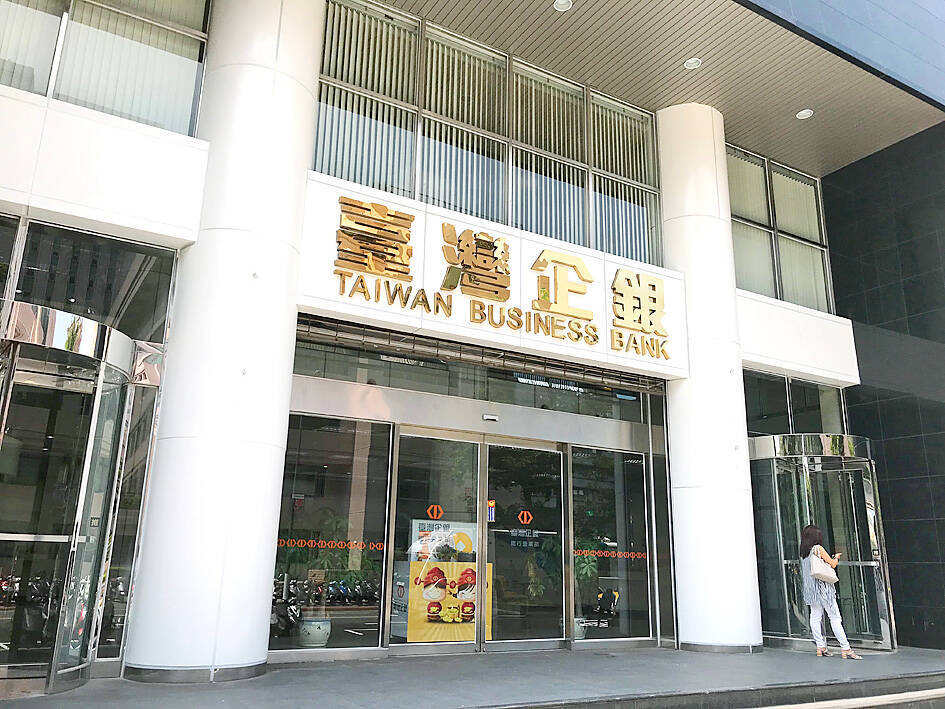State-run Taiwan Business Bank (TBB, 台企銀) yesterday reported record net profit of NT$7.09 billion (US$227 million) for the first three quarters of this year, up 82 percent from the same period last year, on the back of growing interest and fee income amid monetary policy tightening at home and abroad.
The earnings momentum might sustain until the end of this year or early next year, as the US Federal Reserve is expected to continue to raise policy rates to curb inflation and Taiwan’s central bank would likely follow suit with milder hikes to narrow the gap between the two nation’s interest rates, TBB told an online investors’ conference.
Cumulative net profits in the first three quarters were NT$8.3 billion, or earnings per share of NT$0.88, company data showed.

Photo: Chen Mei-ying, Taipei Times
Interest income grew 14.32 percent year-on-year to NT$15.14 billion for the first nine months, while fee income advanced 24.1 percent year-on-year to NT$3.06 billion, the lender said.
Growth in loan, wealth management and financial product transactions lent support to fee incomes, TBB officials said.
Outstanding loans expanded 8.4 percent annually to NT$13.33 trillion, compared with a 10.9 percent increase in deposits to NT$17.27 trillion, the bank said.
TBB would continue to build up deposits in overseas markets to take advantage of wider interest spread, the lender said.
The bank would also focus on providing loans to small and medium-sized enterprises (SMEs), after its loans to SMEs rose 9.4 percent to NT$674.2 billion for the first three quarters, it said.
The bank would focus on asset quality while adjusting its loan structure to improve profitability, officials said, adding that its bad-loan ratio fell to 0.2 percent and its coverage ratio rose to 619.5 percent at the end of September, the best showings in the past two years.
Interest spread was 1.38 percent and net interest income was 0.98 percent, significantly higher than last year, but loan demand is expected to slow in light of higher borrowing costs, the bank said.
Like its peers, TBB incurred losses of NT$7.1 billion in other comprehensive incomes because of bond value downturns, so it would avoid building bond positions and favor short-term debts instead, the bank said.
The strategy paid off as related losses had been mitigated last month, TBB officials said.
However, they were reluctant to give statements on the bank’s dividend policy for next year, saying that the board would factor in full-year earnings and other considerations before reaching a decision next year.
TBB shares yesterday closed flat at NT$12.75, weaker than the TAIEX’s 0.46 percent gain.

The US dollar was trading at NT$29.7 at 10am today on the Taipei Foreign Exchange, as the New Taiwan dollar gained NT$1.364 from the previous close last week. The NT dollar continued to rise today, after surging 3.07 percent on Friday. After opening at NT$30.91, the NT dollar gained more than NT$1 in just 15 minutes, briefly passing the NT$30 mark. Before the US Department of the Treasury's semi-annual currency report came out, expectations that the NT dollar would keep rising were already building. The NT dollar on Friday closed at NT$31.064, up by NT$0.953 — a 3.07 percent single-day gain. Today,

‘SHORT TERM’: The local currency would likely remain strong in the near term, driven by anticipated US trade pressure, capital inflows and expectations of a US Fed rate cut The US dollar is expected to fall below NT$30 in the near term, as traders anticipate increased pressure from Washington for Taiwan to allow the New Taiwan dollar to appreciate, Cathay United Bank (國泰世華銀行) chief economist Lin Chi-chao (林啟超) said. Following a sharp drop in the greenback against the NT dollar on Friday, Lin told the Central News Agency that the local currency is likely to remain strong in the short term, driven in part by market psychology surrounding anticipated US policy pressure. On Friday, the US dollar fell NT$0.953, or 3.07 percent, closing at NT$31.064 — its lowest level since Jan.

The New Taiwan dollar and Taiwanese stocks surged on signs that trade tensions between the world’s top two economies might start easing and as US tech earnings boosted the outlook of the nation’s semiconductor exports. The NT dollar strengthened as much as 3.8 percent versus the US dollar to 30.815, the biggest intraday gain since January 2011, closing at NT$31.064. The benchmark TAIEX jumped 2.73 percent to outperform the region’s equity gauges. Outlook for global trade improved after China said it is assessing possible trade talks with the US, providing a boost for the nation’s currency and shares. As the NT dollar

The Financial Supervisory Commission (FSC) yesterday met with some of the nation’s largest insurance companies as a skyrocketing New Taiwan dollar piles pressure on their hundreds of billions of dollars in US bond investments. The commission has asked some life insurance firms, among the biggest Asian holders of US debt, to discuss how the rapidly strengthening NT dollar has impacted their operations, people familiar with the matter said. The meeting took place as the NT dollar jumped as much as 5 percent yesterday, its biggest intraday gain in more than three decades. The local currency surged as exporters rushed to